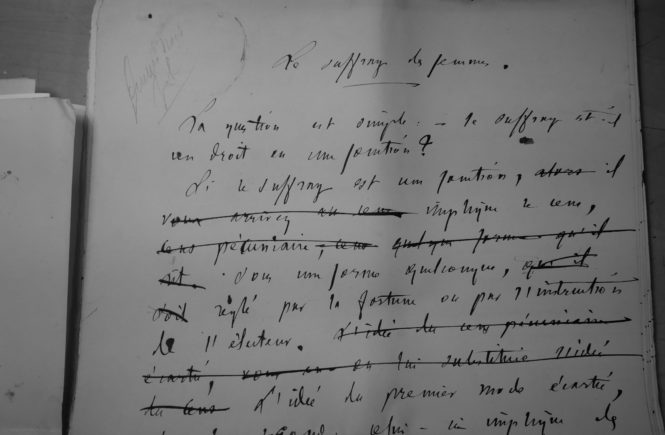It is tempting for a liberty-minded historian to leave untouched the comforting presumption that French classical liberals, who championed freedom for the individual in the 17th, 18th and 19th centuries, must have upheld women’s rights too. Contemporary studies, while often obliterating the role of men in the development of feminist rhetoric, have found occasionally in the history of ideas some remarkable advocates well ahead of their times, and they have offered them as objects of uncritical admiration, in a sort of reconciliatory carnival. One easily concludes that feminism was burgeoning in every century, and that the rising tide was lifting up all boats. […]
Benjamin Constant, The Liberty of Ancients Compared with that of Moderns (1819)
Benjamin Constant, The Liberty of Ancients Compared with that of Moderns (Unknown, 1819). The Liberty of Ancients Compared with that of Moderns Gentlemen, I wish to submit for your attention a few distinctions, still rather new, between two kinds of liberty: these differences have thus far remained unnoticed, or at least insufficiently remarked. The first is the liberty the exercise of which was so dear to the ancient peoples; the second the one the enjoyment of which is especially precious to the modern nations. If I am right, this investigation will prove interesting from two different angles. Firstly, the confusion […]
Jean-Baptiste Say, Introduction to the Treatise on Political Economy (1803)
A SCIENCE only advances with certainty, when the plan of inquiry and the object of our researches have been clearly defined; otherwise a small number of truths are loosely laid hold of, without their connexion being perceived, and numerous errors, without being enabled to detect their fallacy.
For a long time the science of politics, in strictness limited to the investigation of the principles which lay the foundation of the social order, was confounded with political economy, which unfolds the manner in which wealth is produced, distributed, and consumed. Wealth, nevertheless, is essentially independent of political organization. Under every form of government, a state, whose affairs are well administered, may prosper. Nations have risen to opulence under absolute monarchs, and have been ruined by popular councils. If political liberty is more favourable to the development of wealth, it is indirectly, in the same manner that it is more favourable to general education.
Material on the French school of political economy
Pierre de Boisguilbert (1646-1714) Hazel Van Dyke Roberts, Boisguilbert: economist of the reign of Louis XIV, New York, Columbia University Press, 1935 “Boisguilbert: An Early French Economist“, 1873, Westminster Review Vauban (1633-1707) A Project for a Royal Tythe, or General Tax, which by suppressing all the ancient funds and later projects for raising the public revenues, and for ever abolishing all exemptions, unequal assessments, and all rigours and oppressive distraining of people, will furnish the government a fixt and certain revenue, sufficient for all its exigencies and occasions, without oppressing the subjects, London, 1708 (see also the 1710 edition) Richard […]

